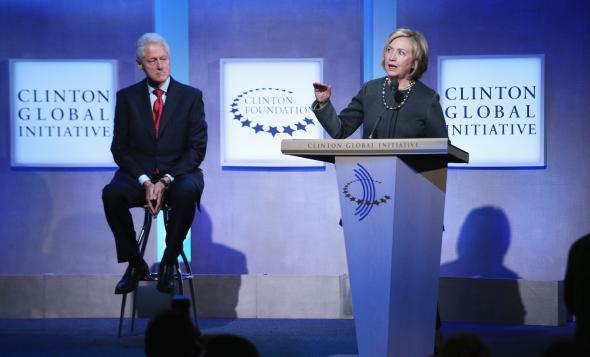And so it begins. The New York Times and the Washington Post on Thursday published separate investigative reports digging deep into the finances of Hillary and Bill Clinton, their family foundation, and the overlap between their interests and those of their global patrons. Neither report provides a smoking gun, but both illustrate a politically fraught dynamic that is expected to dog Hillary throughout her 2016 campaign.
Both newspapers were given a sneak peek of Clinton Cash, the forthcoming book by conservative journalist Peter Schweizer that has already become a partisan flashpoint. The Post says that its article “is based on reporting and documents collected independently from Schweizer’s book.” The Times, meanwhile, says that it “scrutinized his information and built upon it with its own reporting.” The paper’s previously announced intention to do just that prompted Clinton’s allies to accuse the Gray Lady of working with conservatives to unfairly discredit Clinton—a claim that made little sense then, and even less now.
The Post’s account is the latest to examine how difficult it is to separate the Clintons’ personal wealth from the Bill, Hillary & Chelsea Clinton Foundation. About one-quarter of the roughly $100 million that Bill was paid for speaking engagements between 2001 and 2013 came courtesy of companies and organizations that are also major donors to the foundation, according to the paper. Furthermore, as the Post put it: “The multiple avenues through which the Clintons and their causes have accepted financial support have provided a variety of ways for wealthy interests in the United States and abroad to build friendly relations with a potential future president.”
The Times report, meanwhile, details how foreign contributions from people involved in a major uranium deal flowed into the Clinton Foundation’s coffers at the same time Hillary Clinton’s State Department was evaluating the deal. The completed pact ultimately resulted in the Russian atomic energy agency, Rosatom, becoming “one of the world’s largest uranium producers and brought [Vladimir] Putin closer to his goal of controlling much of the global uranium supply chain,” according to the paper. The narrative is a complicated one, but here’s a snippet that raises some of the biggest red flags:
As the Russians gradually assumed control of Uranium One in three separate transactions from 2009 to 2013, Canadian records show, a flow of cash made its way to the Clinton Foundation. Uranium One’s chairman used his family foundation to make four donations totaling $2.35 million. Those contributions were not publicly disclosed by the Clintons, despite an agreement Mrs. Clinton had struck with the Obama White House to publicly identify all donors. Other people with ties to the company made donations as well.
And shortly after the Russians announced their intention to acquire a majority stake in Uranium One, Mr. Clinton received $500,000 for a Moscow speech from a Russian investment bank with links to the Kremlin that was promoting Uranium One stock.
At the time, both Rosatom and the United States government made promises intended to ease concerns about ceding control of the company’s assets to the Russians. Those promises have been repeatedly broken, records show.
That sounds rather damning in isolation, but there are a few important caveats. For starters, the geopolitical landscape when the deal was approved was quite different than it is today. At the time, the Obama administration was hoping for a fresh start with Russia—illustrated by then-Secretary Clinton gifting a symbolic “reset” button to her Russian counterpart. Flash-forward to today—after Russia’s annexation of Crimea from Ukraine—and it’s clear those efforts failed. It’s also important to note that while the State Department signed off on the deal, so did a handful of other government agencies, any of which could have taken any concerns directly to President Obama. Even if Hillary had a direct hand in the deal—and it hasn’t been confirmed that she did—she wouldn’t have been the only person at the table.
Neither the Post nor the Times proved the couple engaged in quid pro quo with donors while Clinton was secretary of state, and Clinton’s campaign has offered a full-throated defense of the couple’s actions. No one “has ever produced a shred of evidence supporting the theory that Hillary Clinton ever took action as secretary of state to support the interests of donors to the Clinton Foundation,” a spokesman told the Times, adding: “To suggest the State Department, under then-Secretary Clinton, exerted undue influence in the U.S. government’s review of the sale of Uranium One is utterly baseless.”
Similar accusations of favor-trading are ever-present in American politics, but the Clintons face a particular challenge defending themselves given the weight of their combined influence, both past and present. While it’s common for former presidents to hit the speaking circuit after leaving office to collect six-plus-figure paydays, none of those other men had a realistic chance of finding themselves back in the White House as the spouse of a president. Bill’s speeches—and general relationship with global donors—and the Clintons’ larger efforts pose a unique quandary when it comes to potential conflicts of interest. The couple’s less-than-stellar track record when it comes to matters of transparency doesn’t help either.
Given voters will likely never know the Clintons’ true motivations in these cases, the Times and Post reports are at the very least clarifying of their actions. What voters see in broad brushstrokes will go a long way in deciding whether the Clintons find themselves back in the White House.
